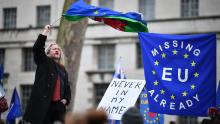Alleged assault of Black politician shines spotlight on Europe’s lack of racial diversity

“I do not think that we have issues now in Europe that blatantly pertain to police brutality or issues of race transcending into our systems,” Schinas said. “But we do have an issue in Europe, which is the issue of inequalities and income distribution — making the best for everyone of what we have.”
But a recent account from another European leader suggests otherwise. Pierette Herzberger-Fofana, a German Member of the European Parliament and who is Black, said in an EU debate on racism earlier this month that she had been the “victim of police violence” in an act she believed had “underlying racist tendencies.”
She told the EU Parliament that after spotting nine officers harassing two Black youths in Brussels the evening before she spoke in Parliament, she walked over to film the incident. She said the “police officers then approached me, wrenched my phone out of my hands and four of those armed police officers brutally pushed me against the wall,” and that when she told the officers she was an MEP they didn’t believe her.
The alleged incident is now under investigation by the Brussels Public Prosecutor’s Office, following requests from both Herzberger-Fofana and Brussels-Noord police. A spokesperson for Brussel-Noord Police said of the incident that nothing other than “normal procedure” was followed.
During that same debate, Ursula Von der Leyen, President of the Commission, said: “People protesting on our streets, in our countries, across the Atlantic and around the world are raising their voices — eager to be heard. It is time we did more than listen. It is time we talked about racism — openly and honestly.
She went on to identify a problem that has long dogged EU institutions: a stark lack of racial diversity. “Let us look around here … diversity is not represented, and I will be the first to admit things are not better in the College of Commissioners.”
Critics might wonder why it took so long for a senior EU figure to address this issue.
So, why does the EU have such a blind spot on diversity? Samira Rafaela, a Dutch MEP, says that a “lack of representation and a lack of sharing power” at the top levels of EU politics has led to a “systematic exclusion.” “I draw a direct line between that (lack of) responsibility and the poor representation of Europe’s diversity in its political institution,” she adds.
Alice Bah Kunke, a Swedish MEP, agrees that a limited desire to share power leads to exclusion. “If you have been in politics for 30 years, admitting that you need to look way beyond your normal pool and include people who have very different life experiences to you is difficult.
“But if you stick to this way of doing things, you create an increasingly-elite, exclusive group at the top of the pile.”
This view exists across the political spectrum. Syed Kamall, who pre-Brexit was co-chair of the European Reformists and Conservatives, says there is “complacency” in Brussels that “by having 27 different (mostly white) countries, the EU by definition is diverse.” But nothing could be further from the truth.
Elite groups entrenched in power
While it has less hard power than other EU institutions, representation in the parliament is seen as especially important. “We are the only EU institution directly elected from EU citizens and should represent them appropriately,” says Monica Semedo, a Luxembourgian MEP. However, she goes on to point out that arguably the EU’s most powerful body, the Commission, has an even worse problem.
“Looking at the College of Commissioners there is no ethnic diversity, this is also the case for their teams. Did no black people apply? What is the percentage of success for applicants from minority backgrounds? These questions should make us look carefully at the application and selection processes.”
This is where the real-world impact starts to become more acute. “The shape an EU policy has, the moment it comes out of the EU institutions, determines the ripple effects it will have when policy comes into effect, says Rafaela. “The less diversity there is in this phase of shaping policy, the less inclusive a policy will be.”
Kunke says that who ends up in key roles ultimately comes down to what the EU decides its priorities are — and what sort of life experiences best meet these challenges. “It could be your background as an economist, or it could be that you have experienced fleeing a war-torn country and lived as a refugee. For me it’s obvious that both of these are competences that would be worth having in European politics right now.”
Semedo adds that “people touched by specific problems such as discrimination, exclusion, marginalisation, will need specific measures to overcome the unfairness … It is not possible to meaningfully legislate without involving people who are directly affected.”
Even talking about this stuff has proved difficult for some. “Having the conversation is hard, but getting someone to have the conversation at all is equally hard,” says Rafaela. “Regardless of my personal experience as a young MEP of color, I am struck by the evasiveness of some.”
Kamall describes a time when he pointed out to his colleagues that if they wanted a stark view at EU diversity, then “look at the faces of the cleaners leaving the building early in the morning and contrast that with the white MEPs and officials entering.” He says that the then-Green leader “told me that I had missed the point and that the cleaners were women,” and that another official emailed to congratulate him, “but corrected me by explaining that it was not only cleaners but also security guards who increased the racial diversity of the EU institutions.”
If having this conversation is hard, change is going to be harder — and will require brave leadership. Kunke says that even those who claim to want this change “are just afraid and not brave enough to take risks that could cause themselves to lose power.”
The risk is that if any drive to be more representative fails, then that elite group she described will become more entrenched and more exclusive. And that, as Kunke points out, has ramifications for all EU citizens: “Do you really want people afraid to make hard decisions at the top of European politics?”










